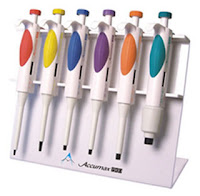Part of the job as a scientist, be it an undergrad, postgrad or employee, is presenting your work, either to members of your lab group, or others in your field of research at conferences. This can be quite a daunting and nerve-wracking experience, especially when it comes to question time afterwards. Like everything in life, presentations get easier with experience and practice, but pangs of nerves will always get you; the most important thing is to be familiar with what you're saying and to try to relax-you will know your work better than anyone, and if there is a tricky question, there's always an answer to it. Here are my tips for making presentations as smooth and enjoyable as possible.
1. Less text-more figures. When first putting slides together, the first inclination is to write up all the text, so you know what you're going to say, and the audience can read along with you. This makes sense, but it is quite counter productive, as the best presentations are the naturally flowing ones that talk around figures and results and don't just involve reading sentences from a slide. Write notes about what you want to say & put key words and phrases on the slides to emphasise what you're discussing.
2. Use animation. If you have several panels or sentences on one slide, it can be distracting for the viewer to see everything at once, and it makes it harder for you to talk through it while trying to remain clear and understandable. Use fade in animations, let one item appear at a time, talk about it, then the next item should appear. This makes your job much easier and also helps to remind you in which order you should be discussing things.
3. Reminder tricks. This is a handy one if there's a lot of data on a particular slide, or if you have one 'hit home phrase or sentence' that's difficult to remember. Arrows that appear before you go onto the next slide are a great way of pointing out the key finding on a slide and can be a fail-safe way of remembering that key point that's really going to sell your results.
4. Practice! The more you go through your presentation out loud, the more comfortable you become with it. Practice with your fellow PhD students or members of the lab group, especially if you have a meeting with your supervisor coming up. If the first time you go through it is in front of your boss then you're bound to get tongue tied (speaking from experience here) so go into an empty office or presentation room with the lab gang and get familiar with it.
5. Have certain answers prepared. Ask others in the lab or your supervisor for potential questions. It's hard to predict what will be asked, it can be something specific and technical, or something much more broad, dealing with translational or physiological significance. You will know the answers to these questions, just keep your mind clear and answer as succinctly as possible; keep everything short and on point. If something comes up that you're not sure of then the old faithful 'that's a very interesting point, and something we hope to look at in the future, however, we have no data on this particular aspect at the moment' is always a handy last minute save!
6. Relax & enjoy it. If you've been selected to speak at a conference, it is a fantastic achievement and speaks highly of your work. Speaking in public is very scary, but often the thought of it is a lot worse than the oral itself; most people say that after the first slide you get into a rhythm and it goes by smoothly. Nerves can also be a good thing, the adrenaline rush makes sure you're awake and on the ball. We all look forward to the day when there are no nerves before a presentation, in my case I can't see that happening until I'm at least 40 though!
These tips don't just apply for science, no matter what the topic, good presenting is easy to achieve and is a fantastic skill to have in all career paths.
If anyone has other tips or advice please feel free to share.
Rachel xxx





